The internet has changed how we live, work, and talk to each other. It offers many benefits and advantages online. Over 4.5 billion people use it, making it key for getting info, staying in touch, and doing business.
It makes shopping online easy, helps with education, and lets us keep in touch with loved ones. This shows its big benefits.
But, there are downsides too. Online fraud, cyber threats, and too much internet use are big worries. Many people get addicted or waste time online, feeling lonely and disconnected.
Also, more cybercrime and identity theft are happening. This means we need strong online security to keep our benefits safe.
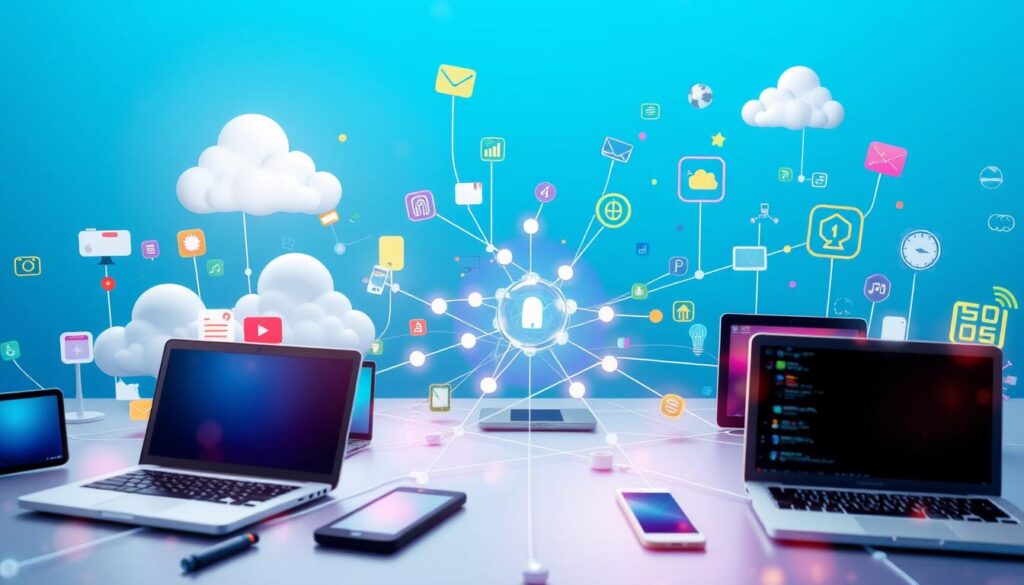
The internet is a big part of our lives today. It’s important to know its good and bad sides. In this article, we’ll look at how it affects talking, learning, and shopping online. We’ll also talk about the risks and challenges of using the internet.
Key Takeaways
- The internet offers many benefits and advantages, like info access, communication, and online shopping.
- Over 4.5 billion people worldwide use the internet, showing its importance today.
- The rise of cybercrime and identity theft is a big worry, affecting online advantages.
- Too much internet use can cause loneliness, disconnection, and addiction.
- Strong online security is key to protect benefits and prevent cyber threats.
- The internet is a big part of our lives, and knowing its pros and cons is important.
The Evolution of the Internet in Modern Society
The internet has changed a lot over the years. It has changed how we live, work, and talk to each other. The internet evolution has made it easy to find information and talk online all over the world.
Today, over 5.47 billion people use the internet. It has become a big part of our lives. Search engines, social media, and online shopping have changed how we find information, connect, and do business.
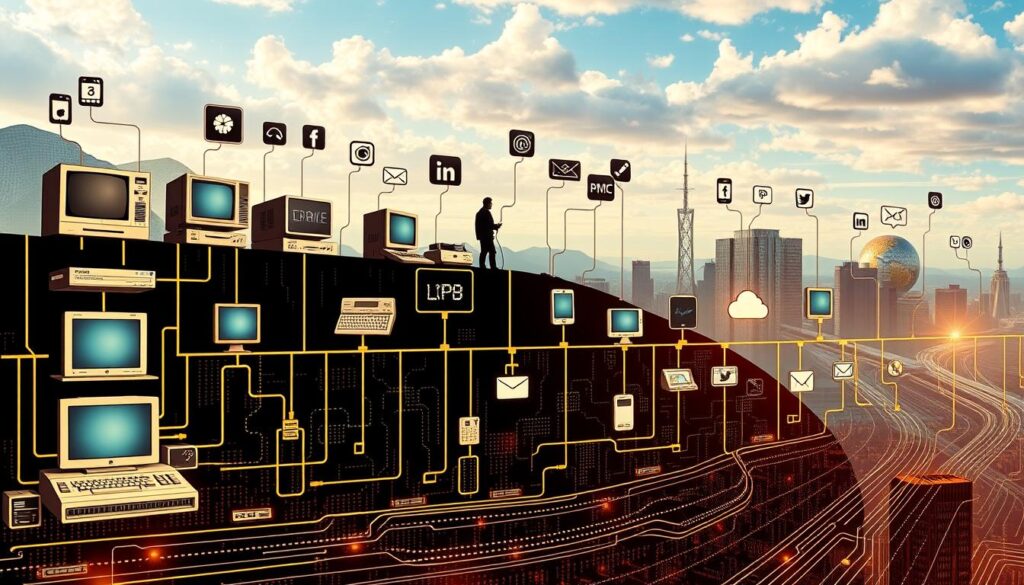
The internet has a big impact on our society. It has given us easy access to information and helped us talk to people everywhere. But, it also makes us worry about privacy, security, and who can use the internet.
The Birth of the World Wide Web
The World Wide Web started a big change in the internet evolution. It let people use web browsers and links to share and find information. This made it easier to explore and use online content.
How the Internet Changed Communication
The internet has changed how we talk to each other. It lets us send emails, use social media, and chat instantly. This has changed how we make friends, work, and do business.
The Rise of Digital Culture
The internet has created a new digital culture. It has online communities, social networks, and places to share content. This lets people express themselves, share ideas, and find others with similar interests.
| Internet Users | Daily Searches | E-commerce Sales |
|---|---|---|
| 5.47 billion | 5 billion | $4.28 trillion |
Understanding the Digital Revolution
The digital revolution has changed how we live, work, and connect with others. It moved us from old electronics to digital ones. Now, more people can learn online thanks to digital tools.
The internet has greatly impacted education. It has made vast amounts of knowledge available. This has opened up new learning paths for many.
The Impact of the Internet on Education
The internet has changed learning. Online education is now more popular. Thanks to the digital revolution, learning resources are available worldwide.
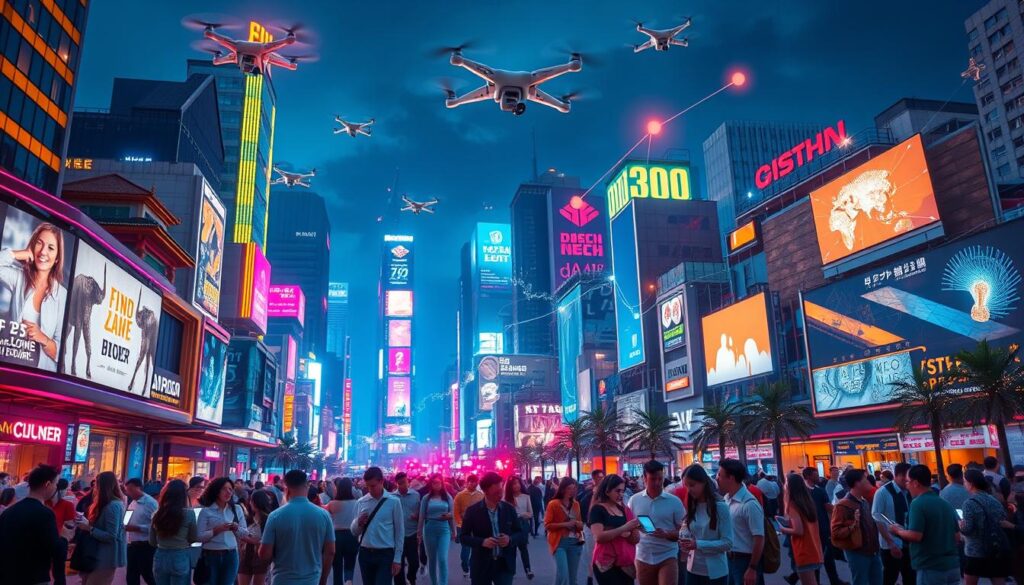
The Role of the Internet in Business and Commerce
The internet has also changed business. E-commerce and digital payments have grown. This lets businesses reach more people globally.
Some key benefits of the digital revolution are:
- More access to learning resources
- Better communication and connection
- More competition and global reach
Key Advantages and Disadvantages Internet Users Face Today
The internet is now a big part of our lives. It changes how we talk, learn, and do things. With over 5.35 billion users, it has opened new ways for learning, shopping, and fun.
But, there are downsides too. Users face risks like cyberbullying, online harassment, and identity theft. These can harm a lot. Too much internet use can also lead to addiction, feeling lonely, and less work done.
Some big internet advantages are:
- Easy access to info and learning resources
- Connecting and talking with people all over the world
- Convenience in online shopping and banking
- Fun and entertainment through streaming services
But, there are also big online disadvantages:
- Risks of cybercrime and identity theft
- Being bullied or harassed online
- Getting too caught up in screens and becoming addicted
- Less time for socializing and doing work

Educational Benefits of Internet Access
The internet has changed how we learn, with many online resources and tools. It lets people learn from anywhere, anytime. This has opened doors for those who couldn’t get an education before.
Online education offers flexibility, affordability, and access. You can take classes from anywhere, saving on travel and other costs. This makes online learning a favorite for many.
Online Learning Opportunities
Online learning lets students learn at their own pace, anytime. It’s great for those needing extra help or wanting to dive deeper into a subject. There are courses and tutorials on everything from basic skills to advanced degrees.
Digital Research Resources
Digital tools make research easier for students. They can access journals and work with peers online. The internet is full of information, making research and assignments more efficient.

Global Knowledge Sharing
The internet lets students share knowledge worldwide. They can connect with experts and peers globally. This fosters collaboration and innovation, breaking down cultural and geographical barriers.
| Benefits of Online Education | Description |
|---|---|
| Increased flexibility | Online classes can be taken from any location, at any time |
| Affordability | Online education eliminates the need for transportation and other expenses |
| Accessibility | Online education is available to anyone with an internet connection |
The Impact on Business and Commerce
The internet has changed business and commerce a lot. E-commerce and online marketing have grown a lot. In 2020, e-commerce sales in the U.S. hit $800 billion, up from $5 billion in 1998. This growth lets businesses sell to people all over the world, make more money, and save on costs.
Some big benefits of e-commerce are:
- 24/7 shopping, showing how it’s faster than traditional shopping
- Access to a huge global market, letting anyone with internet buy online
- Lower costs, like web hosting instead of renting commercial space
Online marketing can reach millions at a lower cost than old-school ads. Big online stores like Amazon, JD Business, and Walmart make over $40 billion.
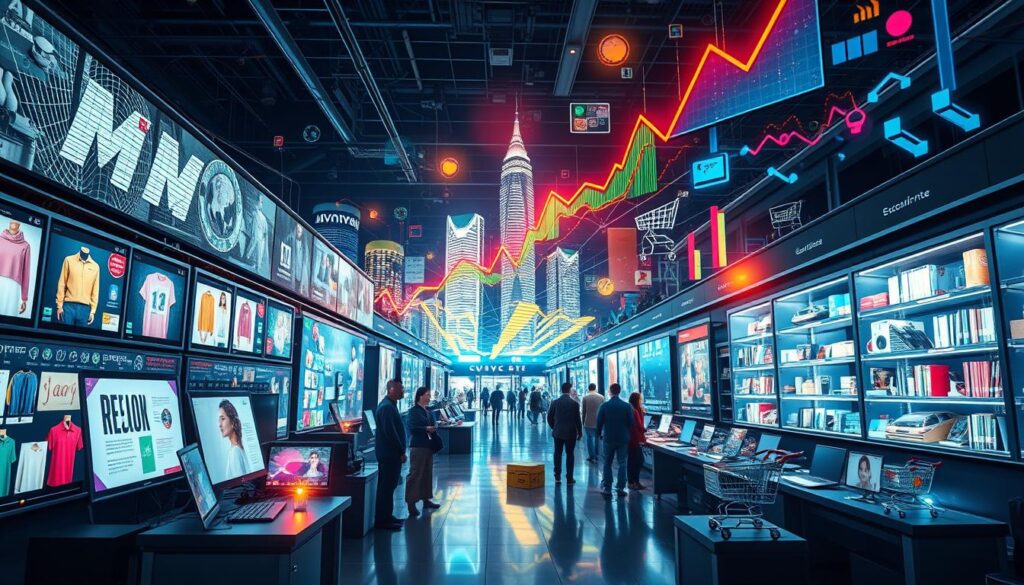
But, online sales are very competitive. Businesses might have to cut prices a lot to stay ahead. Also, bad reviews on social media can hurt a business’s image and sales. Yet, the internet helps businesses reach more people, which is great for small businesses.
As social media platforms have made marketing cheaper, big and small businesses can talk directly to their customers. This has helped small e-commerce stores grow into big brands. It shows a big chance for growth.
Communication and Social Connectivity
The internet has changed how we talk to each other. Social media and online chats are key in our daily interactions. These platforms let us connect, share, and form bonds.
Some good things about social media and online chats are:
- Instant access to info and global connections
- Better ways to communicate and work together
- More convenience and easy access
But, there are downsides too. Misinformation spreads, and online bullying is a problem. Yet, billions worldwide use these tools to stay in touch and share experiences.
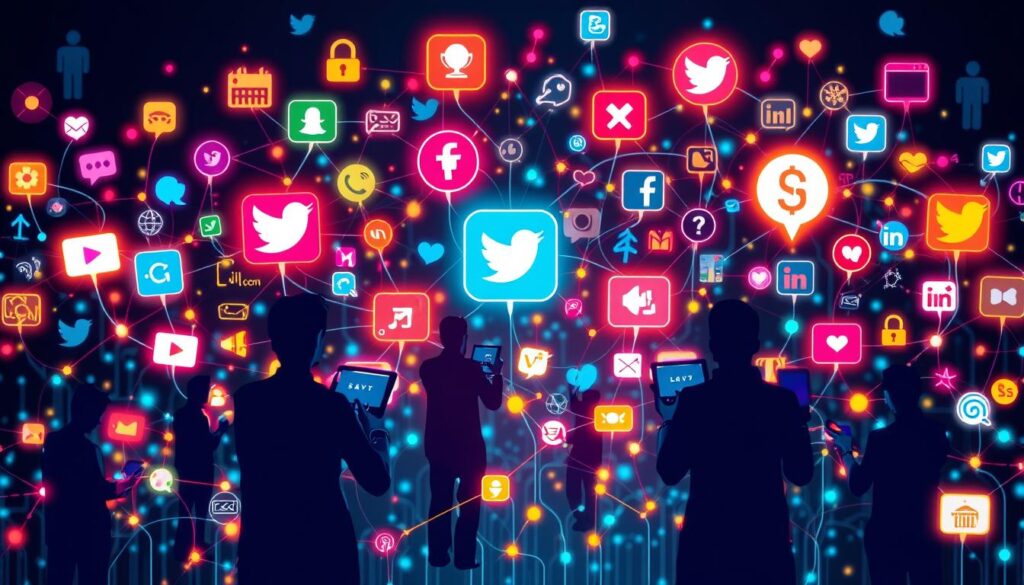
Looking ahead, we must think about how social media and online chats affect us. Knowing the pros and cons helps us use these tools to strengthen our connections.
| Platform | Users | Features |
|---|---|---|
| 2.7 billion | Social networking, messaging, groups | |
| 330 million | Microblogging, hashtags, trending topics | |
| 1 billion | Visual storytelling, hashtags, influencer marketing |
Health and Wellness Concerns in the Digital Age
The digital age has many benefits, but it also has downsides. One big concern is how digital technology affects our digital health and online wellness. Too much screen time can lead to eye strain, headaches, and less physical activity.
Some major health and wellness issues linked to internet use include:
- Increased rates of anxiety and depression
- Poor sleep quality due to screen time before bed
- Sedentary behavior leading to cardiovascular diseases
- Neck pain and “text neck” from poor posture
- “Computer vision syndrome” causing eyestrain and headaches
It’s important to find a balance between our digital lives and physical health. By knowing these concerns and taking steps to address them, we can improve our digital health and online wellness.
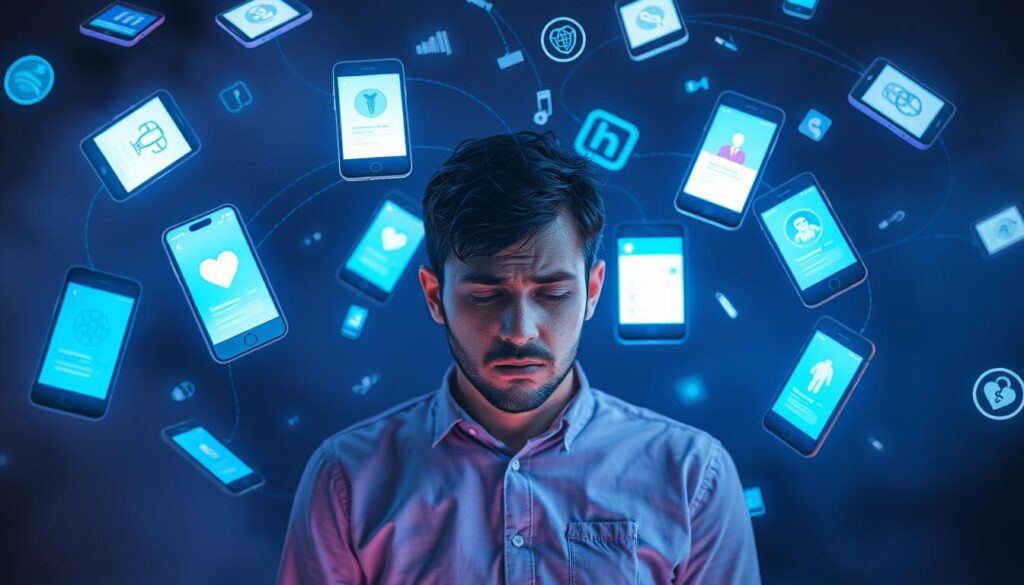
Internet Security and Privacy Issues
The internet is a big part of our lives now. Internet security and online privacy are key concerns. Cybercrime is on the rise, and we need to know how to protect ourselves.
There are many threats online, like cybercrime and data breaches. In 2020, the FTC got nearly 5 million reports of fraud and identity theft. This shows we need strong internet security to keep our data safe.
To stay safe, we can do a few things. For example:
- Use strong passwords and two-factor authentication
- Keep your software and operating systems updated
- Be careful with links and attachments from unknown sources
Companies also need to focus on online privacy. They should use strong security tools and be clear about how they use our data.
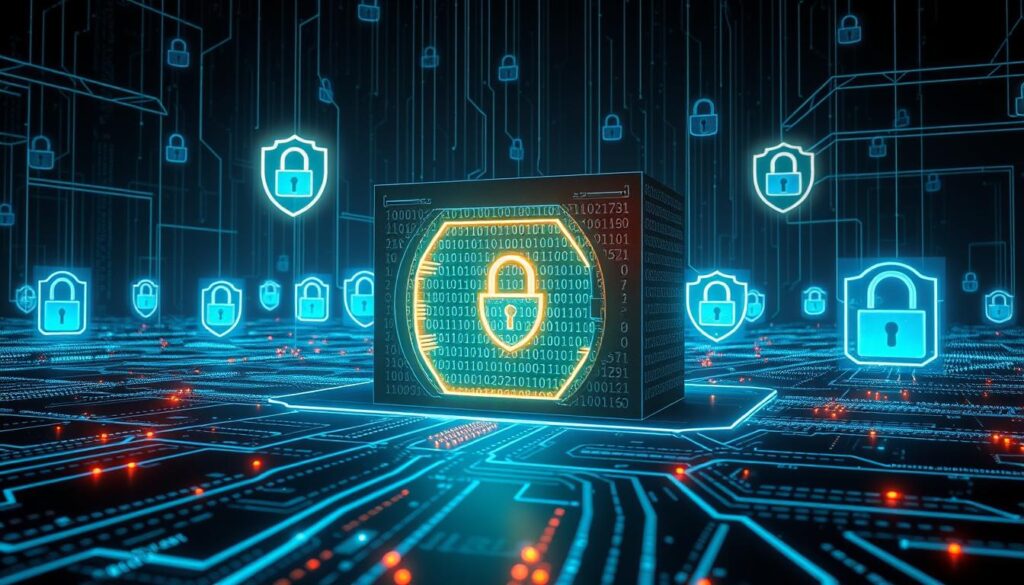
By following these tips, we can lower the risk of cybercrime. It’s important to stay updated on internet security to keep our digital world safe.
| Year | Cybercrime Reports | Financial Loss |
|---|---|---|
| 2020 | 5 million | $10.5 trillion |
| 2021 | 6 million | $12.5 trillion |
Economic Implications of Internet Technology
The internet economy has grown a lot, with e-commerce valued at $100 billion to $200 billion each year. This growth comes from online businesses reaching more people and selling more. The internet also created new jobs, like online freelancing and managing e-commerce sites.
One big advantage of the internet economy is saving money. For example, processing claims electronically costs $2-4, compared to $10-15 for paper claims. This saves businesses a lot, like in healthcare where 40% of claims are electronic.
The internet also helped digital payments grow. More people are moving away from cash, and this trend is expected to keep growing. Here are some important stats about the internet’s economic impact:
| Category | Statistic |
|---|---|
| E-commerce volume | $100-200 billion |
| EDI claims processing cost | $2-4 per claim |
| Healthcare sector | 40% of doctor’s claims processed electronically |
| Digital payments | Increasingly popular, with a growing global market |
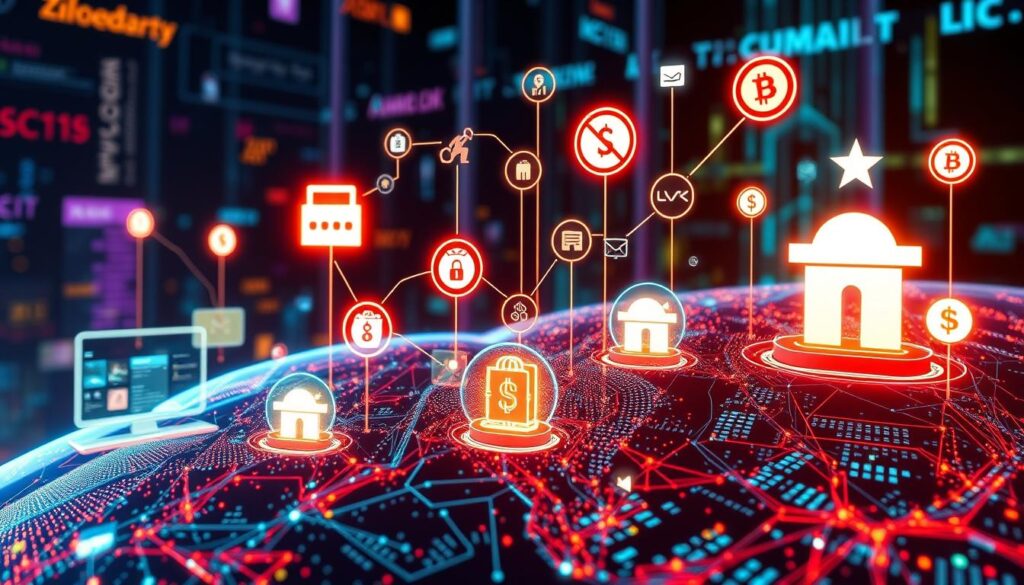
In conclusion, the internet’s economic impact is huge. It offers cost savings, boosts efficiency, and creates jobs. As the internet economy keeps growing, we’ll see more creative uses of internet technology.
The Internet’s Role in Entertainment
The internet has changed the entertainment world a lot. It offers endless online entertainment choices. Now, we can enjoy streaming services, join gaming communities, and create digital content easily.
Services like Netflix, YouTube, and Hulu let us watch movies, TV shows, and music whenever we want. This change has also altered how content is made and shared.

Streaming Services Revolution
Streaming services are very popular. Netflix has over 223 million subscribers as of Q3 2023. The global streaming revenue is expected to hit about $184 billion by 2027, Statista says.
Gaming Communities
Gaming communities have grown a lot too. The global video game market was worth about $159.3 billion in 2020. The internet has made it possible to play online games, experience virtual reality, and join gaming groups.
Digital Content Creation
Digital content creation has opened up the entertainment world. It lets artists, writers, and musicians share their work online. This has brought new talent and unique content to the scene.
| Platform | Subscribers/Users | Revenue |
|---|---|---|
| Netflix | 223 million | $184 billion (projected by 2027) |
| YouTube | 2.5 billion monthly active users | N/A |
Environmental Impact of Internet Infrastructure
The internet has a big environmental impact. It uses a lot of energy and creates a lot of e-waste. This waste pollutes our environment. Also, the energy used by data centers and networks adds to greenhouse gas emissions.
Some numbers show how big the problem is:
- Digital technologies cause about 4% of global carbon emissions.
- The energy used by digital tech grows by 9% every year.
- Data centers are a big source of new electricity demand worldwide.
Companies like Nimbus are trying to lessen their environmental harm. They use renewable energy and cut down on carbon emissions. For instance, Nimbus’s data centers save about 45 million tonnes of CO2 each year.
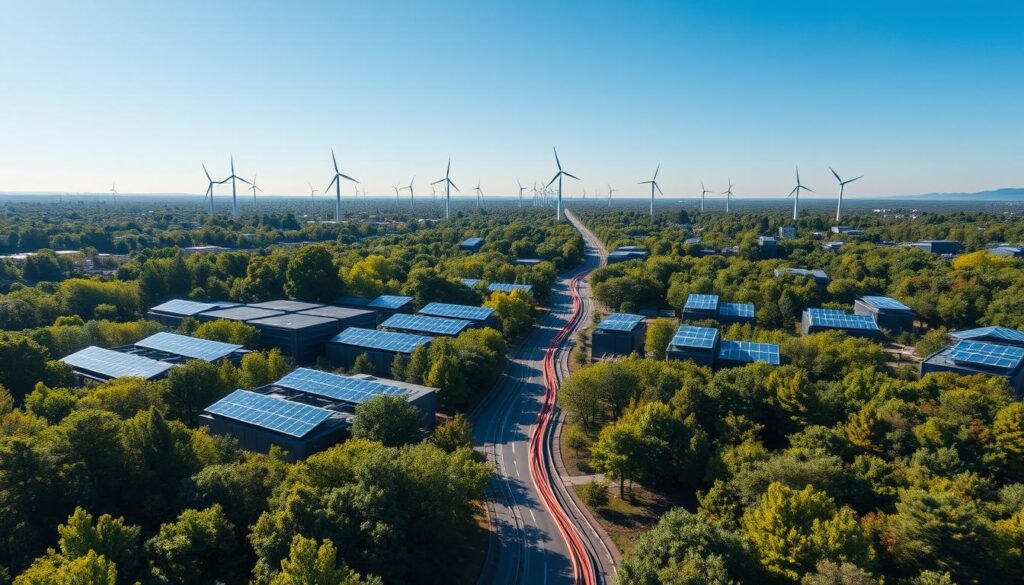
To lessen the internet’s environmental harm, we need to think about our online actions. This includes sending emails and watching videos. By choosing wisely and supporting green companies, we can help reduce the internet’s carbon footprint. This will make our digital world more eco-friendly.
| Category | Carbon Emissions |
|---|---|
| Digital technologies | 4% of global carbon emissions |
| Data centers | Collectively form one of the largest sources of new electricity demand globally |
| Nimbus’s data centers | Save approximately 45 million tonnes of CO2 each year |
Digital Divide and Accessibility Challenges
The digital divide is the gap between those who can use the internet and those who can’t. About 70% of the world’s population is on the wrong side of this divide, known as the Digital Abyss. This gap is huge, with most people in rich countries having better tech, fast internet, and advanced devices.
Almost three billion people worldwide don’t have internet access. This divide affects how countries develop, impacting their productivity and growth. Not having access to technology is often due to cost, lack of knowledge, and not seeing the internet’s value.

- Low digital skills, with nearly 50% of the population aged 65 to 74 years having low digital skills
- Gender gap in Internet usage, with 62% of men using the Internet compared to 57% of women
- Lack of access to devices and stable internet connections, with 63% of young people aged 15 to 24 not having an Internet connection at home
It’s key to tackle the digital divide and make internet access better. This helps everyone, no matter their background, to be included in the digital world. Governments and groups are working hard to teach people about digital skills, like the National Digital Skills Plan and the Guadalinfo centers.
Future Trends and Developments
The internet is always changing, with new internet trends popping up daily. Looking ahead, future developments will greatly change how we live and work. Key trends include artificial intelligence, blockchain, and the Internet of Things (IoT).
These technologies could change healthcare, finance, and education for the better. For instance, IoT can make processes more efficient, saving costs. Also, 5G networks and edge computing will boost internet speed and security.

It’s vital to keep up with the latest internet trends and future developments. This way, we’re ready for what’s coming and can seize new opportunities. With AI, blockchain, and IoT, the internet’s future looks bright and full of chances.
Creating a Healthy Digital Balance
As we explore the digital world, keeping a digital balance is key. This ensures our online wellness stays strong. With devices and the internet always at our fingertips, it’s easy to get lost in the digital world. This can harm our mental and physical health.
Too much screen time can cause eye strain and lower productivity. It also raises our stress levels. Plus, constant notifications and distractions make it hard to focus and enjoy meaningful activities.
To find a healthy digital balance, we must set limits and focus on online wellness. This means having device-free time, staying active, and practicing mindfulness. Here are some tips to help you start:
- Set a daily time limit for device use
- Engage in physical activity, such as walking or yoga, to reduce screen time
- Practice mindfulness and meditation to reduce stress and increase focus
- Establish a bedtime routine that doesn’t involve screens

By focusing on digital balance and online wellness, we can lessen the harm of too much screen time. This helps us have a healthier relationship with technology. It’s about finding a balance that fits your life.
| Benefits of Digital Balance | Results |
|---|---|
| Reduced screen time | Improved sleep quality |
| Increased physical activity | Improved mental health |
| Improved focus and productivity | Increased sense of well-being |
Conclusion
The internet has changed our world in big ways. It has opened up new chances in talking, learning, and business. But, it also brings new problems that we need to think about.
To get the most out of the internet, we need to use it wisely. We should learn how to use it well, stay safe online, and use it responsibly. This way, we can enjoy its good sides while avoiding its bad ones.
By being careful and keeping a balanced view, we can use the internet to our advantage. It can make our lives better in many ways. As the internet keeps growing, it’s important for us to adapt and find a good balance. This will help make sure technology helps us, not hurts us.
FAQ
What are the main advantages and disadvantages of the internet?
The internet offers easy access to information and connects us globally. It also has many online resources. But, it can lead to cyberbullying, online harassment, and identity theft. It can distract us and lead to addiction, social isolation, and lower productivity.
How has the internet evolved in modern society?
The World Wide Web’s birth was a big step for the internet. It made sharing and accessing information easier. Social media, email, and instant messaging have changed how we communicate. The internet has also created a new digital culture with online communities and social networks.
What is the impact of the digital revolution on our lives?
The digital revolution has changed how we live, work, and interact. It has greatly impacted education, with online learning and digital resources. It has also changed business, with e-commerce and online marketing. The internet has also led to social changes, like social media and online activism.
What are the key benefits and drawbacks of internet use today?
The internet’s benefits include easy access to information and global connectivity. But, it also has risks like cyberbullying and identity theft. It can distract us and lead to addiction and social isolation.
How has the internet revolutionized education?
The internet has changed education, with online resources and global access. It allows people to learn from anywhere, anytime. It also makes research easier and enables global knowledge sharing.
What is the impact of the internet on business and commerce?
The internet has changed business, with e-commerce and online marketing. It helps businesses reach more people and save money. Digital payment systems also make transactions easier and safer.
How has the internet transformed communication and social connectivity?
The internet has changed how we communicate, with social media and email. It connects people worldwide and helps build relationships. It also supports long-distance relationships through video calls and messaging apps.
What are the health and wellness concerns associated with internet use?
Internet use can cause eye strain and headaches. It can also lead to addiction and social isolation. Cyberbullying and online abuse can cause stress and depression.
What are the security and privacy concerns related to the internet?
The internet poses risks like hacking and data breaches. Protecting personal information is essential. Strong passwords and encryption are needed to stay safe online.
What are the economic implications of the internet?
The internet has boosted the economy with e-commerce and online marketing. It has also created new jobs in digital fields. This has helped businesses grow and reach more customers.
How has the internet transformed the entertainment industry?
The internet has changed entertainment, with streaming services and gaming communities. It offers on-demand access to movies and music. It also allows artists to share their work globally.
What is the environmental impact of the internet infrastructure?
The internet has a big environmental impact, with energy use and e-waste. The production and disposal of devices pollute. Data centers also contribute to greenhouse gas emissions.
What are the challenges of the digital divide and internet accessibility?
The digital divide is a gap in internet access. Some countries and communities lack access. Affordability and accessibility issues also exist, making it hard for some to use the internet.
What are the emerging trends and developments in the internet?
The internet is always changing, with new trends like AI and blockchain. These will impact areas like healthcare and finance. 5G networks and quantum computing will also improve internet speed and security.
How can we create a healthy digital balance in the internet age?
Finding a healthy balance online is key. We need to be aware of the risks and benefits. Digital literacy and online safety are also important to protect ourselves.